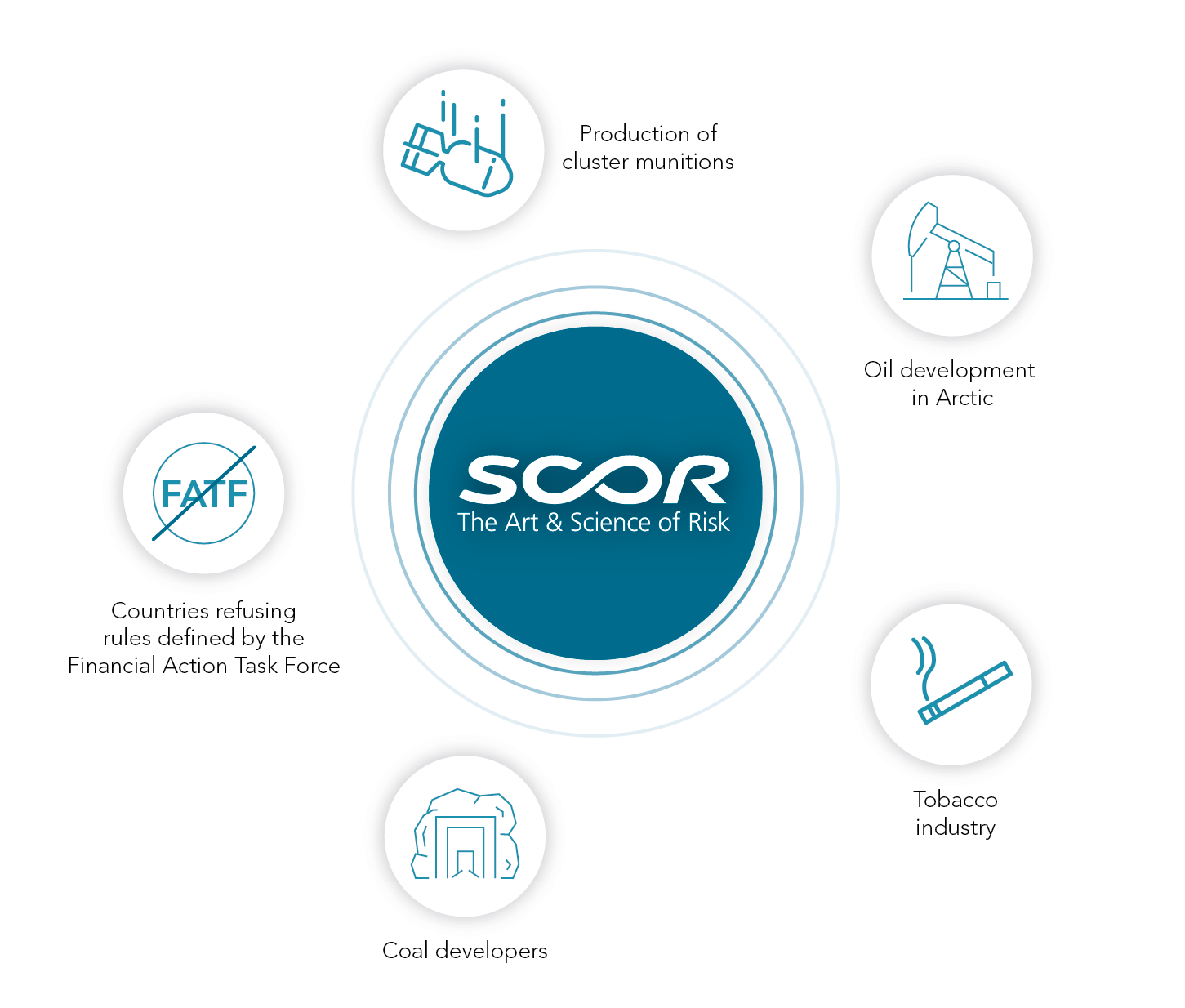-
Sustainable Investments
Today, society faces staggering sustainability challenges. SCOR’s “Forward 2026” strategic plan details our strengthened commitment to meeting those challenges head-on. As an institutional investor, SCOR is determined to play its part in contributing to the welfare and resilience of society.

-
SCOR sees sustainability as more than just a way of building a resilient portfolio. We believe that by acting as a sustainable investor, the Group can better manage risks and generate superior long-term returns. Our Sustainability policy sets out an approach that integrates environmental, social and governance criteria into all our investment decisions.
The Group adheres to the United Nations Principles for Responsible Investment and the United Nations Principles for Sustainable Insurance. We promote the adoption of these principles by our partners and foster cooperation in implementing them. We encourage good governance, integrity and accountability as well as the sharing of know-how and expertise. At SCOR, we actively participate in public debate on the future of sustainable finance and are honored to be a member of the Technical Expert Group on Sustainable Finance at the European Commission. -
Sustainable Investing Principles
SCOR bases its investing policy on five pillars:
SCOR has a strong risk culture. Risk management – incorporating environmental, social and governance (ESG) criteria – is embedded in all our investment decisions. In particular, climate risk modeling and management are at the core of our business.
As a responsible investor, SCOR scans its investment universe using ESG criteria. The filters can be negative (see Exclusions, below) or positive.
SCOR engages with issuers to promote good practice and may decide to divest when lack of good practice is detected.
SCOR uses an internal taxonomy to assess the eligibility of investments. To be rated “green,” real estate buildings must be certified and infrastructure debt must finance the transition to a low-carbon economy. We place particular focus on assessing the contribution of investments to the targets of the 17 Sustainable Development Goals (SDGs).
Through national and international dialogue with regulators and institutions, SCOR promotes responsible investment, fostering a better understanding of ESG topics and supporting improved investment decisions.
-
-
SCOR's Investments
SCOR’s investments in the global economy focus on:
- supporting scientific research and cooperation, particularly with regard to modeling natural events and providing a framework for the development of sustainable finance
- developing guidelines for activities in business sectors with high ESG stakes, particularly in carbon-intensive industries, as well as tools to monitor the ESG quality of our investment and underwriting activities
- designing insurance, reinsurance and investment products that respond to highly relevant issues, such as climate change mitigation and adaptation, promotion of health, and access to insurance.
In our investment decisions, SCOR relies on the ESG expertise and engagement of our investment managers to select securities that integrate ESG criteria.
-
How SCOR’s investment portfolio rates
Based on the analysis of environmental and social factors, including governance criteria, the independent, non-financial ratings agency ISS-oekom has rated SCOR’s asset portfolio “C”.
ISS-oekom
C
SCOR's asset portfolio -
Climate Change
 SCOR intends to deliver on our commitment to the Paris agreement. The Group’s internal expertise on climate risk helps us to continuously stress-test the impacts of climate change on our invested asset portfolios and to improve their resilience. At the same time, we carefully appraise the impacts of our invested assets on our planet’s ecosystems. We focus a significant amount of our invested assets on financing the transition to a low-carbon economy and have committed to carbon-neutral investment by 2050.
SCOR intends to deliver on our commitment to the Paris agreement. The Group’s internal expertise on climate risk helps us to continuously stress-test the impacts of climate change on our invested asset portfolios and to improve their resilience. At the same time, we carefully appraise the impacts of our invested assets on our planet’s ecosystems. We focus a significant amount of our invested assets on financing the transition to a low-carbon economy and have committed to carbon-neutral investment by 2050. Climate change and the transition to a low-carbon economy have two types of associated risks: physical risk (resulting from changes in the frequency and intensity of extreme events) and transition risk (arising from new technologies, market innovations and/or increased regulation linked to environmental concerns). SCOR also considers the opportunities that may arise from risks, in particular transition risks, as part of our sustainable investing strategy.
-
Negative Screening: Exclusions
 In line with the Group's engagements on climate change, biodiversity and the sustainable development of society, certain activities or issuers are excluded from SCOR's investment universe. Details of such exclusions can be found in the Group Sustainability Policy.
In line with the Group's engagements on climate change, biodiversity and the sustainable development of society, certain activities or issuers are excluded from SCOR's investment universe. Details of such exclusions can be found in the Group Sustainability Policy. -
More about our Sustainability initiatives:
-

Sustainability at the core of our strategy
-

Sustainable Underwriting
-

Sustainable Operations
-

Sustainable Commitments and Stories
horizontal -